This woodsy coastal Maine landscape looks as if it has been this way for centuries, but a few years ago it had been devastated by construction damage at its edges plus insects and Hurricane Hanna. The understory was gone, leaving the property exposed to the elements and quickly eroding.
Landscape architect Matthew Cunningham gave the first phase of renewal a jump start by addressing erosion problems and planting native pioneer species. Here are the amazing results, lauded by the property's next-door neighbor, the National Park Service at Acadia National Park.
Landscape at a GlanceLocation: Southeast Harbor, Maine
Size: The property is 3 acres total; the new garden is about 1½ acres.
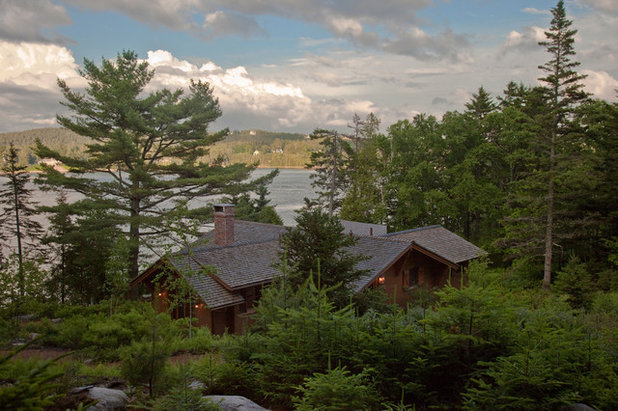
Matthew Cunningham Landscape Design LLC
The home consists of two main parts: The Tea House dates to the early 1900s and is not winterized; The Fox House, built in 2007, is winterized. During the construction of The Fox House, trees on the forest edge were damaged or removed, which left others in the interior vulnerable to wind. After many came down during Hurricane Hanna, runoff water and wind eroded the site at an accelerated pace.
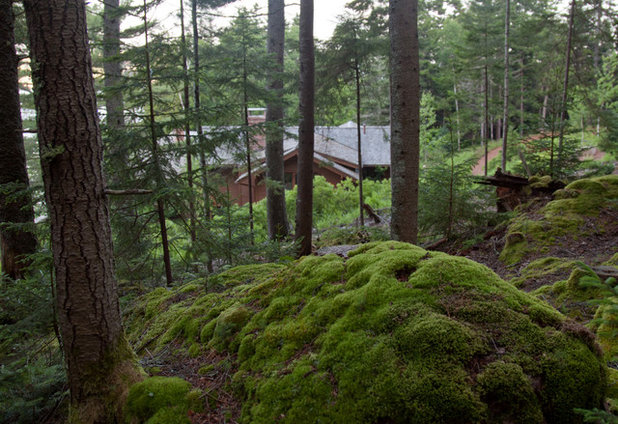
Matthew Cunningham Landscape Design LLC
Cunningham grew up in Maine and is fluent in the design vocabulary of rugged granite chunks, moss-covered boulders, pine paths, evergreen forests and sublime jagged coasts. For the site he envisioned an Acadian garden full of tucked-away spots where people could enjoy solitude and views, working within a greater landscape that would heal the property and begin the process of succession anew.
Using native plants and leftover granite from a nearby quarry, and even covering rocks with moss by hand, he healed the ecological problems while creating a network of paths and terraces for enjoying the surroundings.
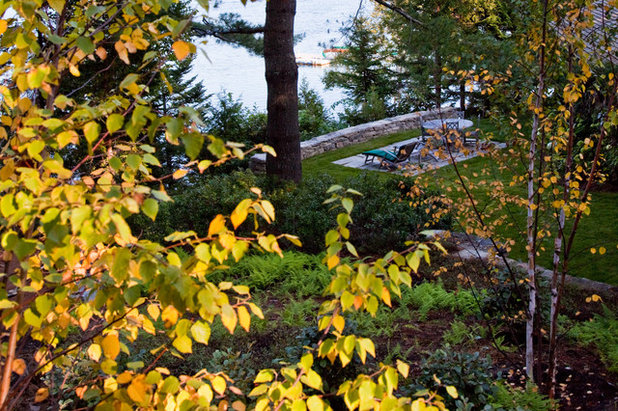
Matthew Cunningham Landscape Design LLC
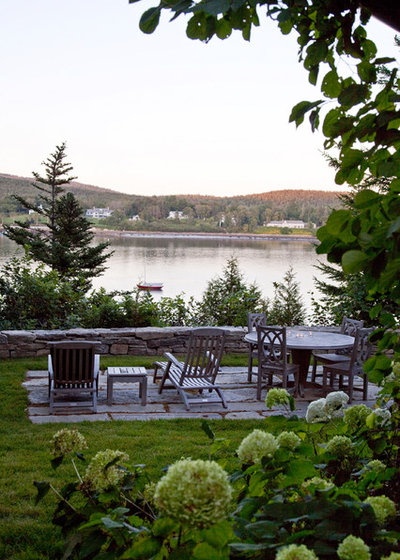
Matthew Cunningham Landscape Design LLC
A patio overlooking Somes Sound "is like an outdoor stone area rug on the lawn," Cunningham says.
Paper birch trees add color and help stabilize the soil. Although he chose many pioneer species that can grow in poor soils, Cunningham also brought in new soils and specialized landscaping fabrics to halt erosion.

Matthew Cunningham Landscape Design LLC
The landscape is back in such good shape that many of the original residents have returned to the habitat. This mama fox was curious enough during the construction process to venture close enough to steal all the workers' leather gloves at night.
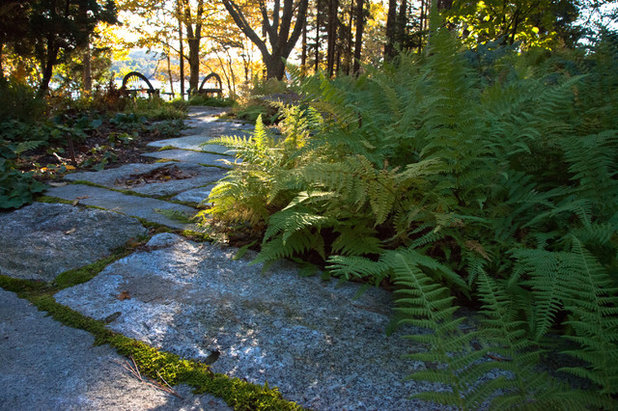
Matthew Cunningham Landscape Design LLC
A sequence of smaller outdoor rooms reflects the character of Acadia National Park.
Locally quarried granite slabs are a common element in Maine landscapes. Cunningham purchased these leftovers from a dealer with the rights to a closed quarry in Frankfort, Maine. "They have been sitting around for years and are already encrusted in lichen, which gives them a patina," he says.
The team hand tucked moss in between the joints to add to the aged feel. This moss comes in dehydrated sheets; you tuck it in place and then water it, which makes it expand. Soon the spores take hold of their new surroundings.
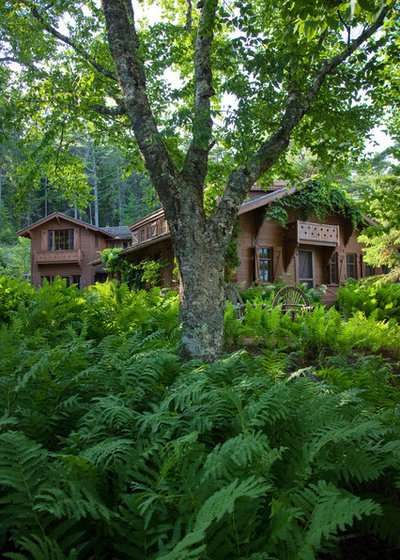
Matthew Cunningham Landscape Design LLC
"Hay-scented fern covers the property like a fabric," Cunningham says. All of the new plants help stabilize the site.
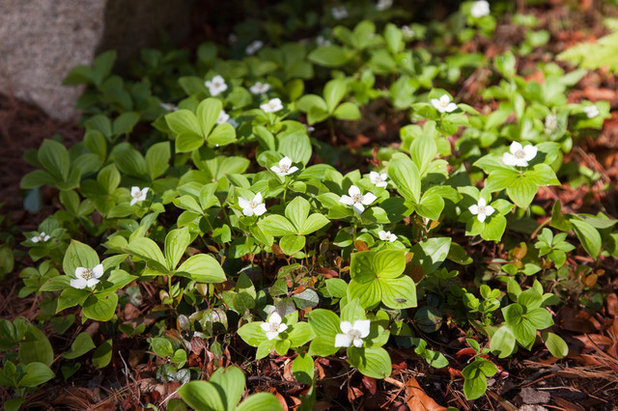
Matthew Cunningham Landscape Design LLC
Bunchberry is often seen softening forest floors in Maine.
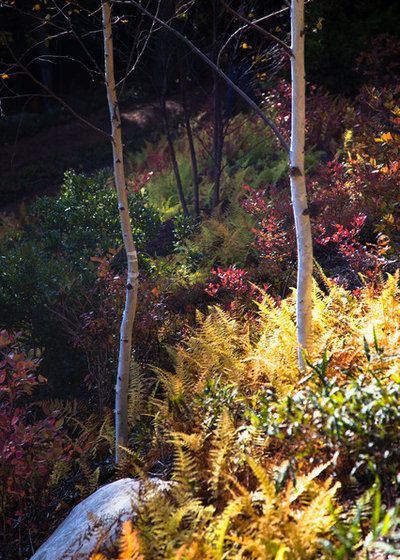
Matthew Cunningham Landscape Design LLC
Other plantings include ferns, bayberry, sheep laurel, viburnum, blueberry and fothergilla.
Many of these plants also provide food sources for the many critters that have returned to the site, including red squirrels, deer, fox, chipmunks and several bird species.
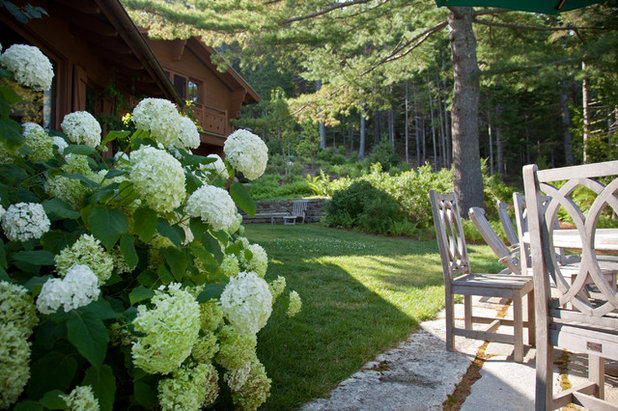
Matthew Cunningham Landscape Design LLC
The plants also have to be durable enough to stand up to deer. Those who come by for a snack leave the Annabelle hydrangeas alone.
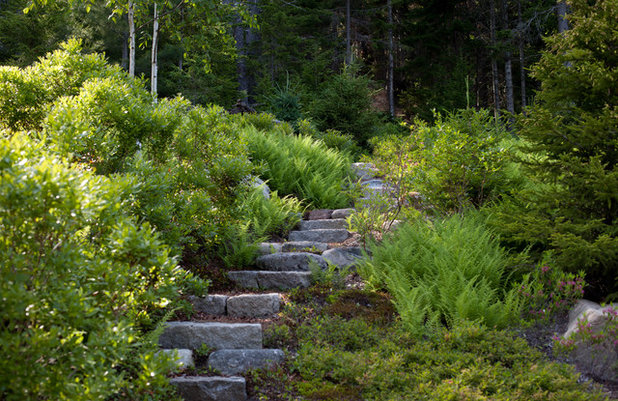
Matthew Cunningham Landscape Design LLC

Matthew Cunningham Landscape Design LLC
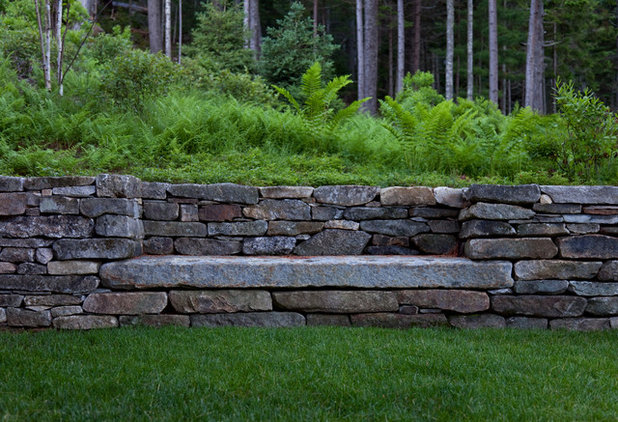
Matthew Cunningham Landscape Design LLC
In one special spot, Cunningham integrated a 9-foot slab of granite into a dry-laid fieldstone wall overlooking the sound.
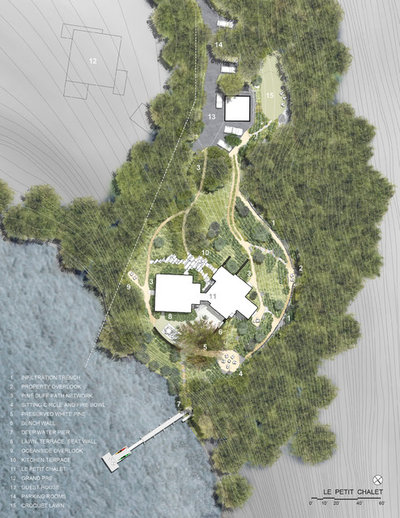
The plan gives you a better idea of the circulation pattern and relationship of the property to the edge of the sound.
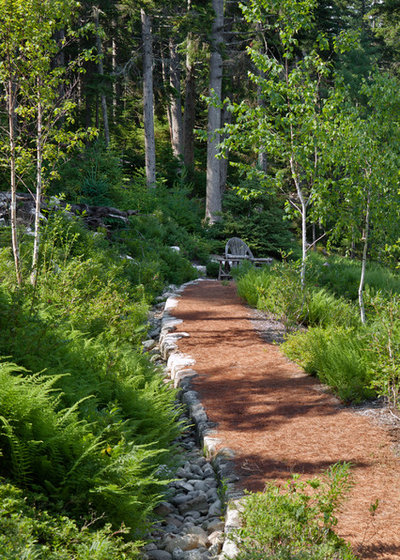
Matthew Cunningham Landscape Design LLC
Some of the paths serve multiple functions. Cunningham did some major grading to keep runoff waters from eroding the property; the hill to the left directs the water to a trench at the path. It then percolates into large pipes and drainage basins.
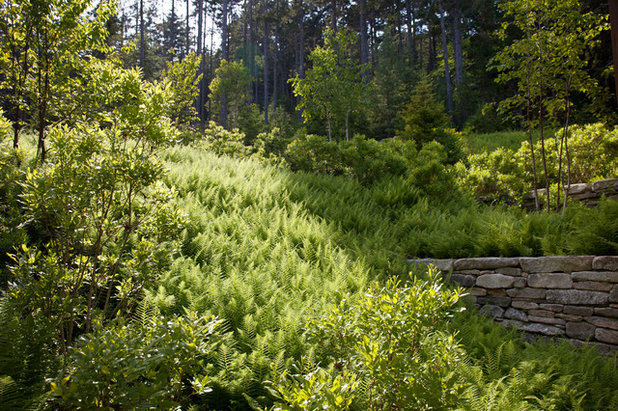
Matthew Cunningham Landscape Design LLC
Minimal retaining walls help the house look nestled into the slope. Ferns soften the edges of the fence and make it seem to disappear into the earth.
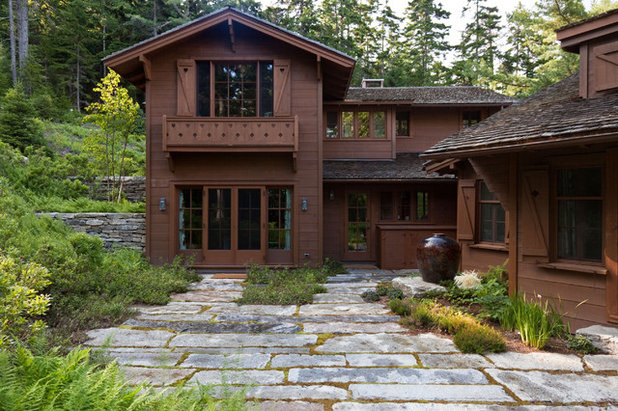
Matthew Cunningham Landscape Design LLC
The kitchen, nestled into the lower level, leads out to this stone terrace.
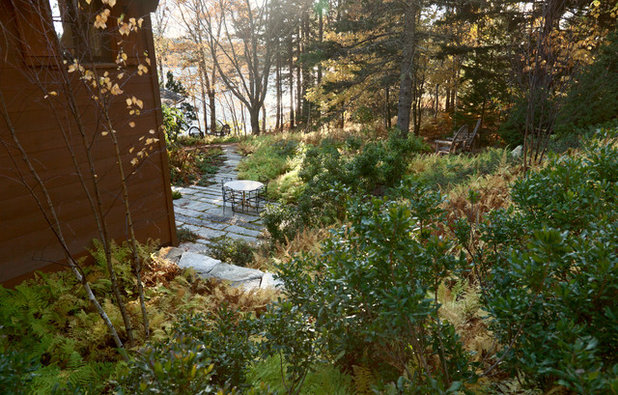
Matthew Cunningham Landscape Design LLC
Large granite slabs extend the terrace out toward other outdoor rooms.
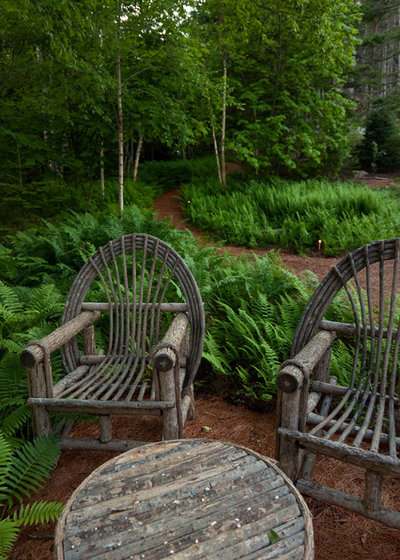
Matthew Cunningham Landscape Design LLC
Two can keep an eye out for bald eagles from this overlook.
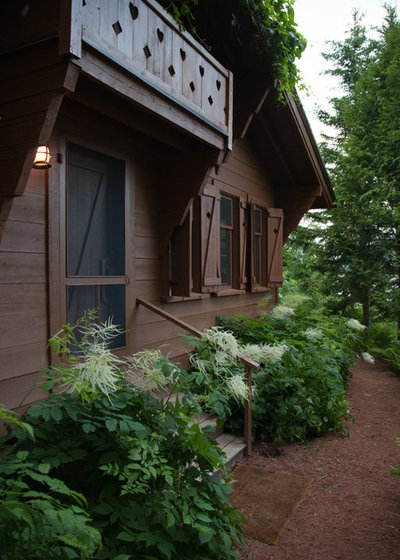
Matthew Cunningham Landscape Design LLC
Unmanicured style fits the home's rugged park-chalet aesthetic.
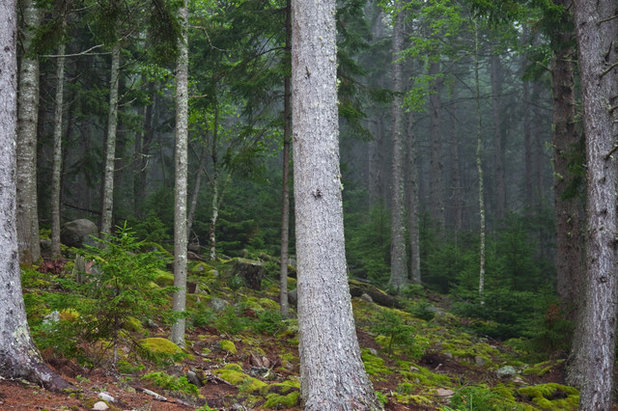
Matthew Cunningham Landscape Design LLC
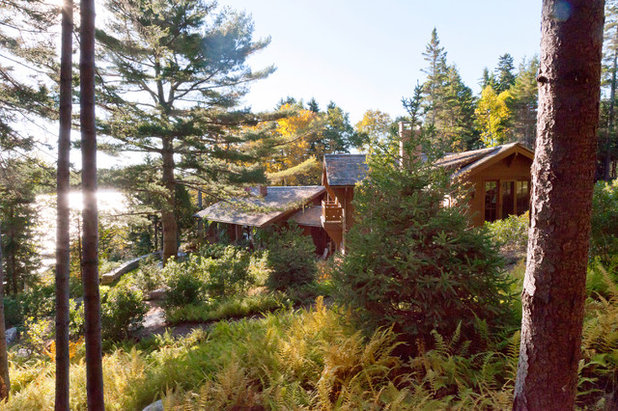
Matthew Cunningham Landscape Design LLC
The house is once again tucked into a sublime coastal wood's edge, where a natural cycle of succession is starting the forest anew. With Cunnigham's help, the homeowner has created a legacy for generations of her family to enjoy watching the forest transform around them.





